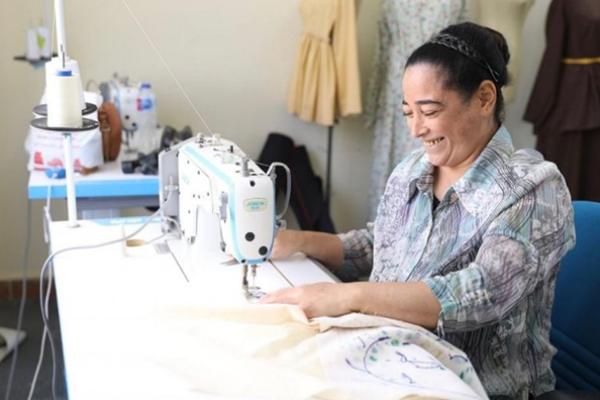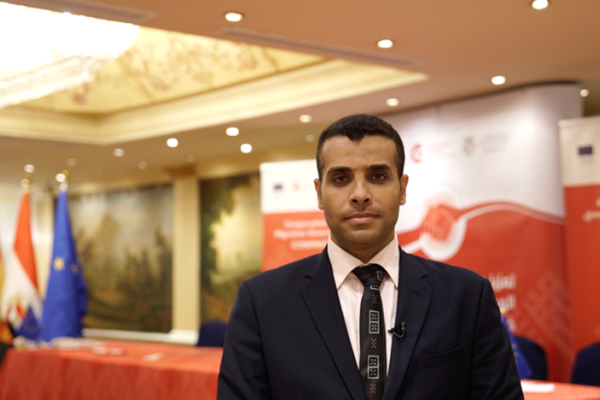Migration and forced displacement are global phenomena. To better manage migration and mobility along the various migratory routes, address the challenges, and harness the opportunities stemming from international migration, as well as to promote safe and legal alternatives to irregular migration, the EU works jointly with third countries and international partners at bilateral, regional and multilateral levels. This engagement is especially important in the neighbourhood of the EU, both in the South and in the East, as well as in the Western Balkan region.
Following a comprehensive approach to migration and asylum, as per the guidelines of the European Council, the external dimension of EU migration policies focuses on several key areas. These include the protection of vulnerable migrants, asylum seekers and refugees, legal migration and labour mobility, addressing the root causes of irregular migration, combating smuggling of migrants and trafficking in human beings, strengthening border management capacities of partner countries, in addition to the returns of irregularly staying migrants from the EU to their countries of origin, as well as the support to voluntary returns and sustainable reintegration of returnees in their countries of origin.
The EU adopts a whole-of-route approach in its cooperation with countries of origin and transit along the main migratory routes. This cooperation, carried out in synergy with dedicated EU Agencies like the European Border and Coast Guard Agency Frontex, the EU Asylum Agency (EUAA) and Europol, helps partner countries manage migratory flows more effectively.
Migration policies should not be dealt with in isolation. The EU Pact on Migration and Asylum foresees embedding migration within comprehensive, balanced, tailor-made and mutually beneficial partnerships with countries of origin and transit, which can deliver mutual benefits in areas like the economy, development, education and skills, stability and security and people-to-people contacts.
Following this approach, over the course of the years, the EU has been strengthening its partnership with key countries of origin and transit along the different migratory routes, in full coordination with EU Member States as Team Europe, notably through the adoption of several regional EU action Plans.
Southern Neighbourhood
North Africa
“Migration and mobility” is one of the key EU policy priorities in the Southern Neighbourhood, as stated in the New Agenda for the Mediterranean (2021).
Support to migration management in the North of Africa region has been channelled through two main financing instruments:
The EU Emergency Trust Fund for Africa (EUTF) was established in November 2015 by the European Commission, 25 EU Member States, as well as Norway and Switzerland, with the aim of delivering an integrated and coordinated response to the diverse causes of instability, irregular migration and forced displacement in Africa. In the North of Africa region, it has been a key instrument in addressing migration challenges.
Over the course of its mandate, from 2016 until 2021 (with projects ongoing until 2025), the EU has channelled through the North of Africa window of the EUTF close to €1 billion focusing on the following priorities: 1) protection of vulnerable migrants, asylum seekers, refugees, and host communities for community stabilisation; 2) support to integrated border management and fight against smuggling and trafficking in human beings; 3) support to labour migration; 4) support to improved migration governance and assisted voluntary return and sustainable reintegration. With the end of the operational phase of the EUTF by December 2025, no new programmes have been adopted since December 2021, while 29 projects in North Africa are still under implementation (as of end-August 2024).
Since the start of the EUTF, 2.6 million basic and social services have been delivered in the North of Africa region. 4.9 million people, including in host communities, improved their access to basic social services thanks to the construction or renovation of 1 360 social infrastructures and to the training of over 20 000 staff. In terms of economic and employment opportunities, around 15 000 people benefitted from professional trainings, 3 600 people developed income-generating activities and close to 18 000 jobs were created. More results can be found in the yearly reports of the EUTF for North Africa: Objective and governance - European Union (europa.eu)
The Neighbourhood, Development and International Cooperation (NDICI) – Global Europe Instrument (2021-2027) builds on successful actions carried out under the EUTF and the European Neighbourhood Instrument (ENI) for the period 2014-2020.
In this framework, the MULTI-ANNUAL INDICATIVE PROGRAMME FOR A MULTI-COUNTRY MIGRATION PROGRAMME FOR THE SOUTHERN NEIGHBOURHOOD (2021-2027) - European Commission (europa.eu) (henceforth ‘MIP Migration 2021-2027’) sets out EU’s priorities for the programming of migration-related actions in the Southern Neighbourhood. Adopted in November 2022, it focuses on four priority areas:
1. Providing assistance and protection to forcibly displaced persons, including asylum seekers, refugees, Internally Displaced Persons (IDPs), and other persons in need, including migrants in vulnerable situations, as well as host communities notably in North Africa through a multi-sectoral and sustainable approach. Examples of protection assistance interventions include, for instance, support to access to basic services, such as health and education, as well as legal and psychosocial support to migrants, refugees and other people in need of protection.
2. Strengthening asylum and migration governance and management. Support in this area aims at reinforcing the institutional capacities of partner countries to put in place better migration and asylum policies, legislation, procedures and institutions, in line with international protection standards and human rights law. This includes, for example, capacity building and targeted training for border authorities to strengthen their operational capacity to conduct border surveillance and search and rescue operations in respect of human rights, as well as to enhance the detection of irregular migrants and of victims of trafficking, supporting the effective prosecution of organised criminal groups engaged in migrant smuggling and trafficking in human beings.
3. Fostering return, readmission and sustainable reintegration. Under this priority, the EU supports migrants who decide to voluntarily return to their countries of origin, by providing direct assistance before departure, and by supporting their socioeconomic integration upon their return to countries of origin, including through the involvement of relevant local authorities.
4. Supporting a comprehensive approach to legal migration and mobility. The EU supports partner countries through programmes that aim at the upskilling and re-skilling of the local labour force and at spurring legal mobility towards the EU - to the benefit of partner countries’ and EU’s Member States labour markets, in full accordance with EU’s Member States and third countries’ interests and priorities.
Between 2021 and 2023, an overall budget of €691 million of NDICI funding has been allocated to migration-related actions in the North of Africa region. Across the duration of the multiannual programming period (2021-2027), budget allocations will be divided along the 4 different priorities of the MIP Migration 2021-2027 (27.6% for priority 1, 49.6% for priority 2, 15.2% for priority 3 and 7% for priority 4). In order to make progress on such priorities the Commission is working closely with partner countries, UN agencies, civil society organisations, international organisations and other implementing partners at programming level.
Furthermore, the EU has concluded comprehensive, mutually beneficial partnerships with Tunisia and Egypt in areas such as economic cooperation and trade, energy, digital, people-to-people contacts and migration. In addition, Talent Partnerships with Morocco, Tunisia and Egypt aim at establishing mutually beneficial labour mobility opportunities between these countries and the EU. These programmes analyse market needs, invest in curricular updates, training and skills development in relevant sectors, connect employers and job seekers and often support circular mobility schemes.
To complement the EU-level efforts and offer an important extra-dimension to such strategic and comprehensive partnerships, the EU and Member States have launched two Team Europe Initiatives (TEI) on migration in December 2022, aiming at a comprehensive Team Europe approach to the Atlantic/Western Mediterranean and Central Mediterranean migration routes. Actions taken under the TEIs may focus on the full range of migration-related activities, including support to capacity building and equipment, and support partners in their own work on refugee protection, asylum and return.
Regional response to the Syrian refugee crisis
After more than thirteen years of conflict, the EU remains committed to help the Syrian people to live in dignity and peace and to find a sustainable peaceful solution, in line with Security Council Resolution 2254.
On 27 May 2024 the EU organised and hosted in Brussels the eighth Brussels Conference on "Supporting the Future of Syria and the Region". The EU and its Member States have been the largest donors supporting people in Syria and the region since the beginning of the crisis in 2011, mobilizing more than €33 billion overall. In 2024, the total amount pledged by the EU and its Member States amounted to almost €6 billion, with €2.12 billion pledged by the European Commission for 2024 and 2025, reaffirming them as the largest donor to the Syria response.
The support to people in Syria and the region is channelled through the following two main instruments:
The EU Regional Trust Fund in Response to the Syria Crisis (the ‘Madad’ Fund) is a major EU instrument addressing the critical needs of more than 5 million Syrian refugees, their host communities and 7.2 million persons displaced in their own country (internally displaced people, IDPs). The EUTF-funded actions are mainly being delivered in three priority countries: Lebanon, Jordan and Iraq. Türkiye has also been the recipient of substantial funding, with some interventions covering also the Western Balkans, Armenia, Egypt and Syria.
Since its establishment in December 2014, the EUTF Syria - Madad mobilised €2.38 billion, including contributions from 21 Member States, Türkiye and the United Kingdom. This funding allowed for 129 crucial projects in seven priority sectors such as basic and higher education, livelihoods, health, water and sanitation (WASH), protection and social cohesion. It has granted access to crucial basic services to over 11 million people in need. Additionally, it has effectively engaged with more than 2 million people through awareness-raising campaigns and provided training opportunities for over 150 000 beneficiaries to strengthen local capacities across various sectors. Finally, the EUTF has played a pivotal role in upgrading, reconstructing and constructing over 13 000 public facilities in the target countries. All projects are featured in a dedicated web platform.
The EUTF Syria - Madad officially ended in December 2021, with projects running until June 2025. However, the EU response to the Syrian crisis is set to continue.
So far, the total support provided between 2021-2023 to forcibly displaced people in and from Syria, as well as their host communities in Syria, Jordan and Lebanon, amounted to €1.705 billion, out of which €742.5 million were provided under the NDICI instrument. See, as an example, the special measures for Syria (€57.1 million), Jordan (€90 million) and Lebanon (€140.5 million) adopted in 2023.
A comprehensive overview of funds mobilized over the years to support people in Syria and the surrounding region can be found in the latest Financial Tracking Report. Country-specific factsheets for Jordan, Lebanon and Syria are also available.
Türkiye
Overall, Türkiye hosts one of the largest refugee populations worldwide. Since 2015, Türkiye has seen an unprecedented influx of people seeking refuge from Syria which to date stands at around 3.1 million. Furthermore, the increasing political instability across its Eastern border has brought around 300 000 asylum-seekers and refugees from other countries including Iraq, Afghanistan, Iran and Somalia.
The EU is committed to assisting Türkiye in dealing with this joint challenge. The March 2016 EU-Turkey Statement provides the overall framework for the cooperation on migration. On 29 November 2023, the European Commission and the European External Action Service adopted a Joint Communication on EU-Türkiye political, economic and trade relations. Its recommendations include - inter alia - to step up cooperation on migration and continue providing support to refugees and host communities in Türkiye.
This commitment is also highlighted in the EU Action Plan for the Eastern Mediterranean route of 18 October 2023, in which the EU is dedicated to support Türkiye in managing migration effectively through continued cooperation on preventing irregular departures and combatting migrant smuggling; support to its border management capacities; strengthen the national asylum and reception systems; and continued engagement to enhance returns and readmission cooperation as provided for in the EU-Turkey Statement and the EU-Turkey readmission agreement.
To date the EU has allocated close to €900 million to support migration and border management in Türkiye.
The EU Facility for Refugees in Turkey is the most salient answer of the EU for supporting refugees and their host communities in the country. It manages a total of €6 billion, out of which €5.4 billion have already been disbursed. To ensure the continuation of initiatives started under the Facility, the EU allocated a further €3.5 billion to refugees and host communities in Türkiye for the period 2020-2023. Out of this, over €1.7 billion disbursed. Hence, since 2011, the EU has directed almost €10 billion to assist refugees and host communities in Türkiye.
EU assistance is aimed at supporting refugees, in particular those living outside of camps and in vulnerable situations, while supporting also their host communities in providing access to quality education, health, protection and livelihoods, as well as other local services.
After the devastating earthquakes of 6 February 2023, the European Commission and the Swedish Presidency of the Council organised on 20 March an International Donors’ Conference to mobilise help for those affected in Türkiye and in Syria. The EU pledged a total of €1 billion for Türkiye. Out of this amount, a specific measure funded with €355.6 million under IPA, aims at improving health and education infrastructure, focusing on enhancing accessibility for refugees and host communities affected by the earthquakes.
The EU remains committed to support Türkiye in the coming years. The revised Multi-Annual Framework for the period 2024-2027 adopted by the European Council on 1 February 2024 foresees an additional amount of €2 billion aiming to help Türkiye in the management of its migration challenges.
Eastern Neighbourhood
Migration management and mobility are a clear priority of the Joint Communication on the Eastern Partnership - Eastern Partnership policy beyond 2020 and the Joint Staff Working Document - Recovery, resilience and reform: post 2020 Eastern Partnership priorities.
The Commission’s Communication on pre-enlargement reforms and policy reviews from March 2024 further highlights the importance of a comprehensive migration and border management within the enlargement process, which now also includes Moldova, Ukraine and Georgia as candidate countries.
Following the adoption of the Pact on Migration and Asylum in May 2024, all the accessing countries will be expected to align their legal frameworks to further enhance the comprehensive migration management, with particular focus on the fight against migrant smuggling, effective returns and reintegration and legal pathways.
Within the Eastern Partnership framework, the EU currently supports the implementation of agreements on visa facilitation (with Armenia, Azerbaijan and Belarus[1]) and readmission (all partners), as well as continued cooperation on visa liberalisation and readmission with Georgia, Moldova and Ukraine, and the implementation of the Commission's recommendations on visa suspension.
The EU actively contributes to strengthening migration management and capacity building in this area, including through cooperation with relevant EU agencies, notably the European Border and Coast Guard Agency (Frontex). Cooperation with Frontex includes joint work on the renewal of bilateral working agreements between the Eastern Partnership countries. Subject to operational needs, negotiation of status agreements with Eastern Partnership countries on deploying European Border and Coast Guard teams is considered.
NDICI programmes in this area include:
- In Ukraine, through the €20.5 million Integrated Border Management programme, the EU supports border management continuity and strengthening of Ukrainian border management agencies.
- In Moldova, as part of the 2023 EU Support Package for the Republic of Moldova, the EU has allocated €4 million to support capacities of Moldovan police and border guards as well as customs services.
- In Georgia, an EU support of €1.9 million was allocated in 2023 to mainstreaming migration into development processes, improving migration governance and border management.
Finally, the EU and partner countries are also working to implement balanced and mutually beneficial partnerships between Eastern Partnership countries to facilitate legal migration, mobility and people-to-people contacts.
-----------------------------------------------------
[1] Cooperation with Belarus has been suspended since 2020, in line with relevant Council Conclusions (October 2020, February 2022, February 2024) and subsequent sanctions, including related to border management. In June 2021, Belarus also withdrew participation in the EaP framework. Additionally, the Visa Facilitation agreement with Belarus, effective since 1 July 2020, has been partially suspended for Belarus government officials since 9 November 2021.
Western Balkans
The Western Balkans are a strategic priority for the EU regarding the EU accession process. Border and migration management along the Western Balkan route is a joint endeavour, and the current positive trends, with a decrease of irregular border crossings by 70% in 2024, are a result of the strong cooperation with partners in the region.
Since 2021, the EU has supported the Western Balkans with more than €350 million to improve migration management in the region. This includes the latest €60 million package adopted in 2024 for Bosnia and Herzegovina, Serbia, Montenegro and North Macedonia. This package covers €47 million of support to further strengthen the migration governance and fight against organised crime and a €13 million programme to operationalise effective return management systems in the Western Balkans, in line with EU standards.
In line with the Western Balkan partners’ commitments in the EU accession process, the EU is working to ensure visa policy alignment with the EU, which is crucial for the good functioning of the visa free regime of the Western Balkans with the EU.
The EU supports the Western Balkan partners in the area of migration and border management through its financial assistance provided under the Instrument for pre-accession assistance (IPA III), with a particular focus on the fight against smuggling networks, border management, judicial and police cooperation and the strengthening of operational capacities. Support, training, deployment of border officials and equipment has been delivered in coordination with Member States’ bilateral actions and based on the needs identified by the Western Balkans authorities. A regional programme worth €36 million focused on anti-smuggling in the Western Balkans was launched in June 2023, focusing on supporting law enforcement and judicial cooperation against criminal networks and increasing border management capacities. The EU has also concluded status agreements with Albania, Montenegro, and Serbia, allowing Frontex to deploy the European Border and Coast Guard standing corps to joint operations in the region. A similar status agreement was signed with North Macedonia in October 2022 with operations launched in April 2023.
The EU is committed to strengthen the asylum capacity of Western Balkan partners as part of the accession perspective, through improved statistics and mechanisms for identification, registration and referral of mixed migratory movements; supporting reception and protection as well as the management of returns across the region through bilateral support and an ongoing IPA programme.
Additional support is provided to the region in the area of border management though a programme implemented by FRONTEX aimed at aligning IBM strategies of Western Balkan partners with European ones. The support aims to further increase the level of implementation of Frontex Status Agreements and the establishment of National Coordination Centres (NCC) in the Western Balkans.
2022
2021
2024
- ANNEX to the Commission Implementing Decision on the financing of the Individual Measure to Strengthen Management Systems of Irregular Migration and Fight Against Organised Crime in the Western Balkans for 2024
- ANNEX to the Commission Implementing Decision on the financing of the individual measure to strengthen return management systems in the Western Balkans for 2024
2023
2022
- CID of 20.4.2022 on the financing of the individual measure to strengthen the response capacity to manage migration flows in favour of the Western Balkans for 2022
- ANNEX 1 of the Commission Implementing Decision on the financing of the individual measure to strengthen border management capacities in favour of the Western Balkans for 2022
- Annual action plan in favour of Montenegro for 2022 - Action Document EU for Integrated Border Management
- Individual measure to strengthen border management capacities in favour of the Western Balkans for 2022
2021-2022
- Strengthening employment, labour and social protection systems and policies in the Western Balkans with SOCIEUX+
- EU Support to Regional Security in the Western Balkans
2021
- Action Document for “EU against organised crime, in support of trade”
- Action 01 - EU4 Migration, Border management and Mine Action
2020
2019
- CID of 19.8.2019 amending CID C(2019)3189 adopting a special measure on supporting Bosnia and Herzegovina in managing the migration flows
- CID on Special Measure as regards Strengthening the Response Capacity of the Republic of Serbia to Manage Effectively Mixed Migration Flows
- Special measure II on supporting Bosnia and Herzegovina in managing the migration flows for 2019
2018
2016
2024
- C(2024) 9168 - COMMISSION IMPLEMENTING DECISION of 17.12.2024 on the financing of the individual measure in favour of migration and border management support in Türkiye for 2024
- C(2024) 9164 - COMMISSION IMPLEMENTING DECISION of 17.12.2024 on the financing of the individual measure in favour of basic needs, municipal infrastructure, health and social cohesion support for refugees in Türkiye for 2024
- Commission Implementing Decision on the financing of the support measure on monitoring and evaluation, audit, and communication of EU support to refugees in Türkiye
2023
2022-2023
- ANNEX of the Commission Implementing Decision on «Individual Measure to Support Border Management in Türkiye in 2022 and 2023 - Support to Türkiye’s Efforts to Strengthen Border Management at the Eastern and South Eastern Border
- ANNEX of the Commission Implementing Decision on the Individual measure for the delivery of cash support to the most vulnerable refugees in Türkiye for 2022 and 2023 - Complementary Emergency Social Safety Net (C-ESSN) to the most vulnerable refugees – phase II
2022
- ANNEX I of the Commission Implementing Decision on the individual measure to continue support for basic needs and transition to livelihoods opportunities for refugees in Türkiye for 2022 - Emergency Social Safety Net (ESSN) IV
- ANNEX II of the Commission Implementing Decision on the individual measure to continue support for basic needs and transition to livelihoods opportunities for refugees in Türkiye - Support to socio-economic development for refugees and host communities in Türkiye
2021
2024
- COMMISSION IMPLEMENTING DECISION on the financing of the special measure in favour of the Hashemite Kingdom of Jordan and support for durable solutions for refugees from Syria for 2024
- COMMISSION IMPLEMENTING DECISION of 13.11.2024 on the financing of the Annual Action Plan 2024 of the Multi-Country Migration Programme for the Southern Neighbourhood
2023
- COMMISSION IMPLEMENTING DECISION of 26.6.2023 on the financing of the Annual Action Plan 2023 of the Multi-Country Migration Programme for the Southern Neighbourhood
- COMMISSION IMPLEMENTING DECISION of 4.9.2023 on the financing of the special measure in favour of Lebanon for 2023
- COMMISSION IMPLEMENTING DECISION on the financing of the special measure in favour of the Hashemite Kingdom of Jordan for 2023
2022
- MULTI-ANNUAL INDICATIVE PROGRAMME FOR A MULTI-COUNTRY MIGRATION PROGRAMME FOR THE SOUTHERN NEIGHBOURHOOD (2021-2027)
- COMMISSION IMPLEMENTING DECISION of 22.11.2022 on the financing of the annual action plan for the multi-country migration programme in favour of the Southern Neighbourhood for 2022 (Part II)
- DÉCISION D’EXÉCUTION DE LA COMMISSION du 22.11.2022 relative au financement du plan d’action pluriannuel en faveur du programme de migration multi-pays en faveur du voisinage Sud pour 2022 (Partie I)
- COMMISSION IMPLEMENTING DECISION of 4.10.2022 on the financing of the individual measure for the multi-country migration programme in favour of the Southern Neighbourhood for 2022
- COMMISSION IMPLEMENTING DECISION of 9.11.2022 on the financing of the special measure in favour of Lebanon for 2022
- COMMISSION IMPLEMENTING DECISION of 11.11.2022 on the financing of the special measure in favour of the Hashemite Kingdom of Jordan for 2022
2021
- COMMISSION IMPLEMENTING DECISION of 17.12.2021 on the financing of the individual measure for the multi-country migration programme in favour of the Southern Neighbourhood for 2021
- ACTION DOCUMENT FOR THE EUROPEAN UNION EMERGENCY TRUST FUND FOR STABILITY AND ADDRESSING THE ROOT CAUSES OF IRREGULAR MIGRATION AND DISPLACED PERSONS IN AFRICA
- COMMISSION IMPLEMENTING DECISION of 15.12.2021 on the financing of the special measure in favour of Lebanon for 2021
- COMMISSION IMPLEMENTING DECISION of 15.12.2021 on the financing of the special measure in favour of the Hashemite Kingdom of Jordan for 2021
2019










